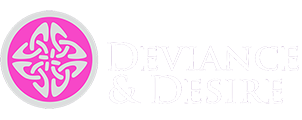Some of this is going to seem very obvious to you, but I hope you’ll bear with me because I have a couple of opinionated insights that might surprise you.
One of the things that separates Dominance/submission from more conventional relationships, I think, is that we’re on a continual learning curve. I’ve been involved in BDSM in one form or another for more than 20 years, and I’m still constantly learning new skills, not just in BDSM technique but also in being a better Dominant. I have goals. There are experiences I want to have and skills I want to learn. And, I am also learning through experience. Each success or mistake makes me better.
The things I want to talk about apply just as much to our everyday goals (learning a new language, saving money, losing weight etc) as they do in D/s, but my experience in kink communities is that there’s a palatable hunger to learn.
We often assume that the gap between where we are now and where we want to be in the future is a knowledge gap. Fetlife is a great example of a place where a lot of knowledge is exchanged every day, and what drives a lot of that traffic is that we assume that the more knowledge we have, the better our results will be, or that new results require new knowledge.
But what if new knowledge doesn’t necessarily bring new results? In fact, if your goal is to actually make progress and not just gain new knowledge, what if it was a waste of time?
STOP THINKING, START DOING
Merlin Mann, who authored the 43folders productivity method, describes practice as “hitting the balls over the net”, and in a post Real Advice Hurts he says:
A tip is like…what? A little scrap of a map. Not only is it not the actual destination, but the part you can hold in your hand will only make sense when you understand its place in a much bigger picture.
So, sure, you might get a kick out of gazing at the pretty colors and reading the funny names to your cat, and, heck, once you’ve collected enough little maps, you may even start fancying yourself a gifted cartographer.
But, never for a minute start fantasizing that being a map collector means you’ve visited all the locations on those pieces of paper. If you ever decided to attempt them, your actual travels would very much benefit from a competent (and whole) map of where you’re heading, but it necessarily requires movement, change, and enduring potentially long stretches in which you’ll have to find your own bearings in three tip-free dimensions.
At their best, “tips” are a fine way to incrementally improve a process that you’re already dedicated to practicing on a regular basis. And, in that context, tips work.
For example, a tip on your golf swing may be very useful if you’re already playing three times a week and hitting a bucket of balls after work every day. But a subscription to a magazine about taekwondo will only be as useful as your decision to drag your fat ass into a dojo and start actually kicking people. Over and over. Otherwise, you’re just buying shiny paper every month.
It’s the difference between learning something new and practicing something new. They seem similar, but they’re not the same thing at all. If you want to write a book, you can talk to a published author, you can research ways other writers structure their plots, you can read a lot. But the only way to become a better writer is to practice writing, and the only way to write a book is for your fingers to click-clack on the keyboard. There’s nothing wrong with research, but passive learning creates knowledge. It’s active practice that creates skill.
LEARNING CAN SUPPORT INACTION
A hurdle that we need to get over with BDSM is that that our communities will always try to convince us that the (knowledge) barriers to entry are high. If you go into a whip board or a shibari board on Fetlife, you’ll find conversations on the right equipment, techniques, safety and a whole range of other things. It’s easy to get brain freeze and feel like you can’t start tying someone until you have jute rope and know 10 different knots and 5 different Japanese ties. Is that really the case? Thousands who have rope from the hardware shop in their bedroom drawer would beg to differ.
It can feel like we’re making quick progress when we’re researching, but it can actually be a way to avoid taking the action that will help us reach the goals we say are important to us. We feel like we’re moving forward, but actually we’re kind of spinning our wheels. Knowledge is fantastic. It’s valuable. But it can be a form of procrastination.
PRACTICING IS LEARNING (BUT LEARNING IS NOT PRACTICING)
You can watch a YouTube video on tying a harness, or attend a workshop on whip cracking, but that knowledge is unproductive unless you actually start using it. You’ve gained new knowledge, but you haven’t put it to any use. When you are actively practicing those skills, not only are you learning but you’re learning from your mistakes. Knowledge is valuable to you, but it’s not a skill until you express it.
PRACTICE DETERMINES WHO WE ARE
The state of your life right now is determined by the habits and beliefs that you have practiced every day. It’s not about the things we dream or the things we learn, it’s about the habits we practice each day. So, it makes sense that if you want to move forward, you need to focus on practicing better habits. It’s really that simple and logical. If you want something, the way to get it is to practice, day in and day out. Logically, you will move forward.
IN DEFENSE OF KNOWLEDGE
Learning for the sake of learning can be a beautiful thing. It can help you make more informed decisions when you do decide to take action. It can fast-track you. It can prevent mistakes (and mistakes can be a serious thing in BDSM). It stimulates the mind.
But, learning alone doesn’t lead to progress. It’s important that we recognise when we are learning and appreciate it for what it is. That way we won’t use it as an excuse to delay the important choice of actually doing something. We’ve all got limited time, so if you have a goal and you’re hoping to fast-track it, you need to think about whether you can spend less time passively learning and more time actively practicing.
Don’t think so much. Do more.

